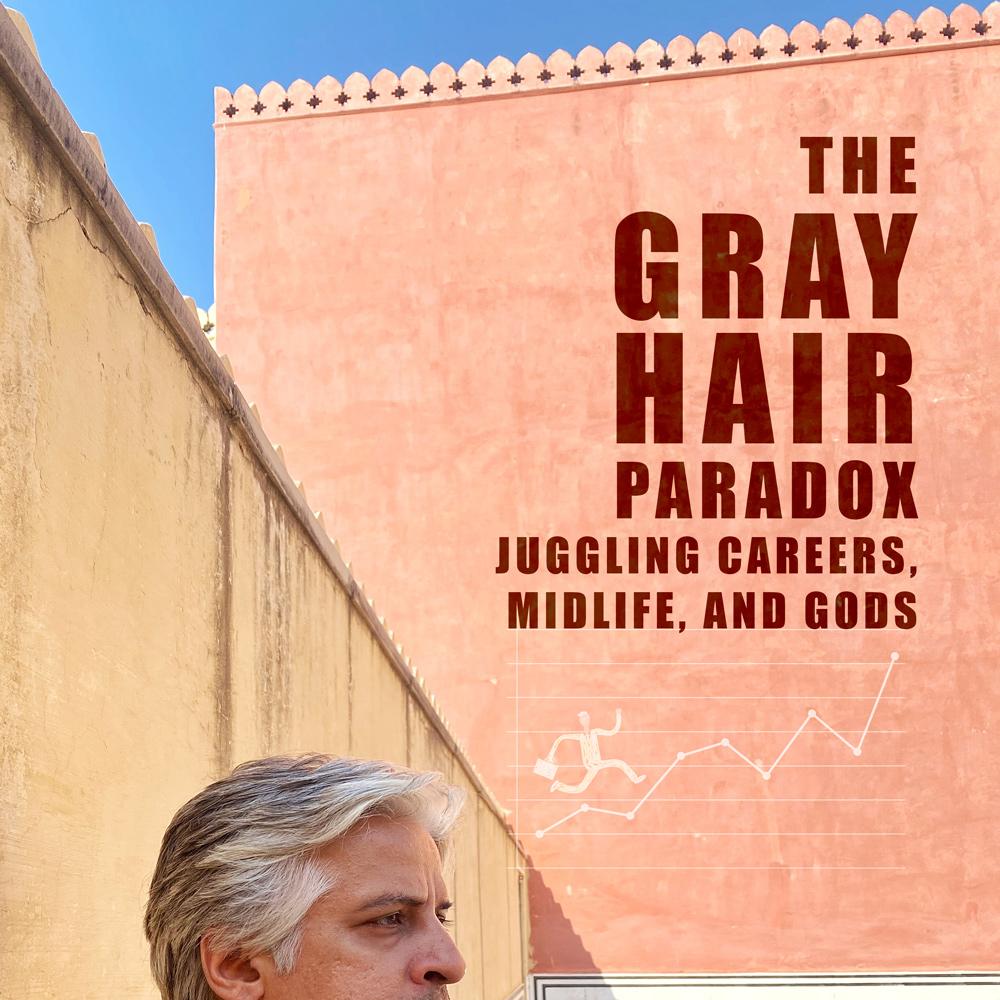
29 Sep The Gray Hair Paradox: Juggling Careers, Midlife and Gods
I began graying in my mid-20s, which, as you can imagine, wasn’t the most confidence-boosting experience. By the time I hit my early 30s, I found myself joining the legions of people who reach for a box of hair dye in the hope of reclaiming their youth. Ironically, the more I dyed it, the quicker the gray seemed to spread, like some kind of twisted botanical experiment where, instead of black growth, you get silver strands sprouting up like weeds with a vengeance. By my late-30s, I was sporting a head of gray hair that seemed a little premature for someone still in his “youth”.
Oh, I tried it all — everything the beauty industry threw at me, every hack and remedy to reclaim my “real age” rather than be judged by the “hair age” I seemed to be wearing like a badge of “what’s gone wrong with your hair”. But as the 40s rolled in, something shifted. I began to feel that, perhaps, my gray wasn’t so bad. A silver mane in your 40s suddenly seemed more “distinguished,” even respectable. And I started to wonder if all that dye had been a bit of a waste of time and effort.
In my 20s, gray hair was definitely a disadvantage. People don’t take you seriously when you look like a miscast trying to be a gray-wizard at a young age. But, oddly enough, in my 40s, it began to have the opposite effect. Suddenly, I found myself in meetings where I was often the only one with graying locks among a sea of eager 20- and 30-somethings. And then there were also the fifty-somethings, comfortably nestled at the other end of the age spectrum, but with notably older skin than mine. I noticed something curious—the younger ones were giving me more attention and even a certain amount of respect! Initially, it made me feel a little uneasy, but then, well, I started to quite enjoy it.
After spending much of my 20s and 30s struggling for validation, it came as a delightful surprise when my silvery-platter got me “attention” and “respect” on a silver platter, whether I asked for them or not. It was then that I began to recognise the superpower I possessed in my hair. The trick, I realised, was to stay quiet most of the time—just throw in the occasional “yes,” “aha,” or “very good” at appropriate moments. It was magic to gain more and more of easy respect and attention!
By the time I crossed into my mid-40s, I had become very comfortable with my newfound status as a “wise” man, thanks to the silvery locks. With every additional gray hair, it seemed that the aura of sagacity increased. I let my hair grow longer, embracing its silver waves — bouncy, lush, with just the right amount of curl, reminiscent of the snow-capped peaks of the Himalayas. I even stopped shaving regularly. Why not make the most of the electric shaver I’d invested in by trimming just occasionally and let the gray stubble show? With long, silver locks and a matching salt-and-pepper stubble, I was suddenly being passed off as a man of wisdom. Ha!
Behold now, this new image came with its own pressures, mind you. People began approaching me for advice — serious, life-altering advice. They seemed to believe that my hair and beard held the secrets to the universe! There I was, the same old me, now forced to dispense wisdom I hadn’t even known, honestly have never possessed.
Naturally, the competitive me had to step up to the role. I began reading more — after all, if I was going to sound wise, I’d better have some substance behind my words. From my mid-40s to my current age (I’m still away from 50, thank you very much), I’ve had a steady stream of visitors seeking my “sage counsel”. Some of them may have confused my professional successes with my appearance, perhaps assuming that the two were deeply connected. They didn’t seem to realise that, like most people, I was just muddling through, and struggling through, day-in and day-out.
Which brings me to something that unfolded the last week. One of my juniors from management school gave me a ring. He’s been in touch over the years, always respectful and polite. He’s working as a consultant in the IT sector and, like many others, he’s found himself feeling rather…bored. He described his job as “mundane, shallow, and downright pretentious at times.” But the good part was that he’s developed a passion for writing and had begun to feel, even believe strongly, being a professional writer was his calling.
He wanted my advice, of course my gray hair signaled more than they are worth. Not to let an opportunity pass by, with my sage persona fully engaged, I gave him my honest thoughts. He was impressed — so much so that he asked if I’d shared these nuggets of wisdom with others.
“I have,” I confirmed modestly.
“Well, have you written about it?” he persisted, clearly impressed with my insight.
“No, not yet. But, you know, I might do it someday,” I said, trying to sound driven.
There was a brief silence on the line.
Then he spoke again, “Would you mind if I wrote about it instead?”
Billions of bilious blue blistering barnacles! The cheek of it! The young fellow was clearly hoping to pass off my pearls of wisdom as his own, albeit politely asking for permission to do so.
I chuckled. “I like you, mate, but let’s not spoil the good thing we have between us. I’ll write about it someday.”
He hasn’t called since, and I keep an eye on his posts just in case he’s pinched my philosophy. So far, so good!
But for closure, here’s how the conversation had unfolded…
Him: “I’m done with my current job. It pays well but it’s boring, mundane, and a bit shallow, honestly.”
Me: “Well, most well-paying jobs are like that. As long as Laxmi (goddess of wealth) is flowing in, why complain?”
Him: “I find writing much more engaging and satisfying. I want to switch careers.”
Me: “Writing for yourself is one thing. Writing as a profession for others is a different beast altogether.”
Him: “I’m confident I’ll make it. Shall I send you some samples for feedback?”
Me: “No need. I’m sure you’re good. Seems like you’ve discovered your inner Saraswati (goddess of knowledge and arts).”
We both laughed, but then I pressed on.
Me: “Are you married? Any kids?”
Him: “Yes, one kid. My wife works in IT too.”
Me: “Ah, so you’re in a good place financially. But remember, writing may be your calling, but making it a career is a different story. Proceed with caution.”
Him: “But how will I know unless I try?”
Me: “True, but we’re not in our 20s anymore. Struggles in the 40s feel heavier—especially with Parvati (goddess of family and harmony) in the picture.”
Him: “Parvati, Saraswati, Laxmi? What’s this got to do with our career?”
Me: “Everything, my friend. Our career, our passions, our responsibilities—they’re all intertwined in a cosmic balance. Saraswati may give us talent, but talent alone doesn’t pay the bills. Laxmi provides the wealth, stability, and foundation for Saraswati to flourish. Without her, Saraswati’s gift is nothing but a fleeting luxury, perhaps a hobby. And Parvati? She’s the embodiment of home, peace, and balance. If we don’t manage these forces wisely, the harmony in our household will crumble. We got to juggle all three, or we might end up with none.”
There was silence on the other end. He was still trying to process the metaphor, perhaps realizing that his whimsical leap into a new career wasn’t as simple as it seemed, or perhaps doubting if he did the right thing to ask for counsel from the gray-haired one.
Him: “But why does it have to be so complicated? Can’t we just follow our passion?”
Me: “Of course, we can. But every passion has a price. We’ve got responsibilities now. We’re not some 20-year-old chasing dreams without a care in the world. When we’re in our 40s, the stakes are higher. The grind is harder. If we want to turn our passion into a profession and into profit, we’ve got to calculate the risk and have a strong safety net.”
He sighed deeply.
Him: “So what would you do?”
Me: “Me? I’d moonlight. Write on the side while keeping a steady income. Build credibility and following. If my writing pays off, fantastic. If not, I’d work for Laxmi to keep things afloat. We’re not gambling with our peace.”
Him: “That makes sense. But it sounds like a slow road.”
Me: “Better a slow road than a crash course to chaos, right? Safety First, Glory Later!”
There was another pause, and I could feel his gears turning.
Him: “You know, I’ve never thought about it like that. Balance the gods, huh? Maybe you’re onto something.”
I chuckled. “That’s what the gray hair’s for. Wisdom, patience, and the ability to juggle. Believe me, I’ve learned the hard way. I have more broken bones than can be seen.”
He laughed, this time more genuinely. “Alright, alright, I’ll take it slow. But if it all works out, you better believe I’m writing an article about this whole ‘three goddesses’ analogy.”
Me: “I like you dude, but let’s not spoil the moment! I will write about it someday.”
Him: “Deal.”
He hung up, and I stared at my phone.
Later that night, I caught myself in the mirror. The silver strands glistened under the bathroom light. Who knew these gray hairs, once my biggest insecurity, would turn out to be my greatest superpower? They were no longer just a sign of age, but symbols of the wisdom and patience that had come from decades of balancing life’s intricate dance between careers, midlife and Gods – Laxmi, Saraswati, and Parvati.
Sometimes, a bit of gray is exactly what you need to see life in full color.
If you liked this post, then you may consider reading The Role of ‘Maya’ in Negotiation and The 5P’s Guide to Blooming Like Saraswati also.



Raman Chadha
Posted at 06:54h, 01 OctoberThanks Enjoyed reading and understanding. God bless you
Sudhakar
Posted at 12:01h, 07 OctoberSuch a great read! I found myself laughing out loud. Perhaps it’s time to think about ditching the hair dye.
Gopinath Chandroth
Posted at 09:37h, 26 OctoberNice one.